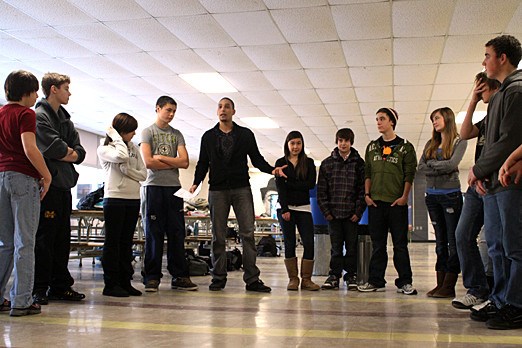Actor Kaleb Alexander is taking on his biggest role yet — teaching children Shakespeare.
The 23-year-old actor knows his William Shakespeare. Alexander has played Lucentio from Taming of the Shrew and the love-struck lead in Romeo and Juliet for the Canadian Actors Equity Association theatre.
He’s worked with students before, but admits he didn’t have much of a plan for the students at Hammarskjold he met on Tuesday.
"I’m really going to play it by ear because I don’t know these kids and I haven’t been a Thunder Bay boy for a long time." Alexander said. "This is more about connecting with the kids and not putting myself in the teacher role."
Alexander wanted to know if acting was right for him, so he left St. Patrick High School after Grade 10 and attended the Wexford Collegiate School for the Arts in Toronto. He spent some time modelling before he enrolled in York University’s conservatory program, which he graduated from in May.
He became involved with Shakespeare in Action, a group that introduces the playwright’s works to youth and attempts to make it relevant in a modern age. A year ago Alexander said he didn’t think Shakespeare’s work was relevant, but he has since changed his mind.
"We don’t really have any writers today that can express human emotion as vividly as he did," he said. "He uses very simple words that are very powerful like oh, it is my lady, oh, it is my love instead of saying I love that girl, man…yeah."
Another reason to keep Shakespeare in the minds of the youth is his universal themes of love, loss and teenage angst. Romeo and Juliet, a story about two young lovers kept separated by their families applies today as much as it did 400 years ago, he said.
In an age with MSN Messenger and sentences reduced to three-letter acronyms, Shakespeare’s often long winded monologues and plays seem out of place. Alexander said the English language has eroded and Shakespeare plays are even more important role.
"I think the digression of the English language is appalling," he said. "It’s important to maintain the fact that we can actually say fully structured sentences and not have these small abbreviations.
“When I talked to them about Shakespeare say don’t just read the line all the way through. When you get to the end of the line, it doesn’t mean it is the end of the sentence. Look at the punctuation and it will make more sense to you as a speaker."
Kellie Leishman, an English teacher at Hammarskjold, agrees that students need to know more about formal writing.
Often students in her class make simple mistakes, such as not capitalising I in a sentence. There’s a time for formal and informal writing and the students need to know the rules of both, she said.
Leishman’s class has reviewed some of Shakespeare’s work, but she said she would have preferred it if her students had watched the play in a theatre.
"In a perfect world I would have taken them to a play, but our distance kind of prevents that," she said. "In southern Ontario you can go to Stratford and see a Shakespeare play live as he intended it, but we don’t have those capabilities."
She added that Alexander’s workshop on Shakespeare was a good way to get her students more involved and feel the play instead of reading the words from a page.
Caylyn Adamko, 14, a Grade 9 student, said he wanted to follow in her aunt’s footstep and become an actor. She said she enjoyed having a chance to learn from Alexander and the opportunity to act out Shakespeare.
"I find Shakespeare to be very different compared to anything else that I’ve ever read before," Caylyn said.
"It was kind of new to me but once you start reading his work it isn’t as hard to understand. I am an actor, so I’m excited to do something a little different compared to the more modern day acting that I usually do."
Sign in or register
- Messages
- Post a Listing
- Your Listings
- Your Profile
- Your Subscriptions
- Your Likes
- Your Business
- Support Local News
- Payment History
Registered Users
Already have an account?
New Users
Create a free account.
